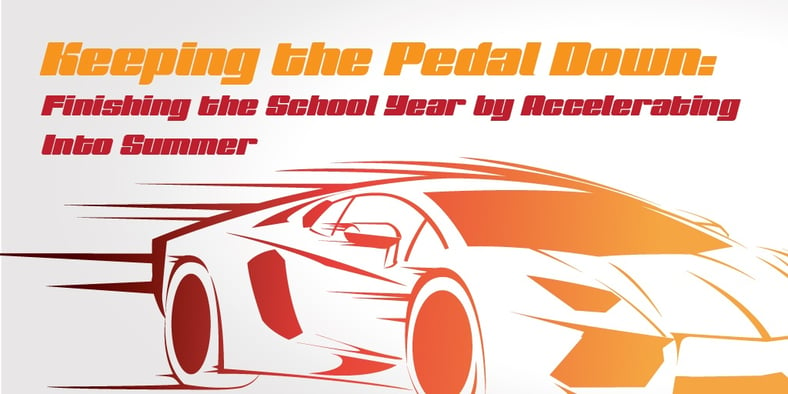
The end of the school year can be tough. These weeks are often less productive than any other time of the school year—but it doesn’t need to be. Part of having a great end to the year is mindset.
How do we really view learning? If learning is something that is possessed by the teacher only to be given to students during the school day, then the end of the school year is a stopping point. When the last day comes, learning is over until the start of the next year. But if learning is something that students seek, find, research, and devour at all times and in all places—and if teachers are merely facilitators of the learning and not the keepers of all the knowledge—then summer represents a different kind of learning possibility, and not just hitting the “pause button” while it is hot out.
Summer Break or Summer Accelerate?
Instead of taking our foot off the gas so we are ready to come to a stop on the last day, what if we kept the pedal down into the end of the school year—or even sped up?
And why would we not? Teachers constantly tell me that time is always an issue and we never have enough. This means we need to use all the time we have and maximize the entire school year. It also means that any learning we can stretch into the summer will only be to the students' benefit.
Here are some ideas for how you can maintain speed and help make sure students are making progress all the way up to the start of summer:
Continue measuring progress: The main factor teachers give for slowing down at the end of the year is grades—either grades are due or they need to get their grades done early. Even if this is true, it doesn’t mean that we have to quit measuring progress. Students probably aren’t working hard just for their grade anyway—they want to see how far they have come during the year. This could be a cumulative spelling or vocab activity, or even measuring fact practice or reading fluency. Any of these can be done on the last day of school and compared to the start of the year, which is not only fun, but also highly motivating. This is great feedback for kids to share with parents, too. It shows how effective the learning has been through the course of the year.
Keep the same expectations as the rest of the year: This can lead to behavior issues in the classroom, but there are other reasons to stay consistent right up until the end of the year. Think about things like bell work or homework—if homework is good for your students, why quit early? Keeping these types of activities consistent will help send a message to students that the pedal is staying down until the end.
Keep the best incentives for when they are needed most: This is probably just common sense for teachers, but it is still worth saying. Because it’s hard to keep moving at the end of the year and the temptation is to “coast” into the last day of school, keep the biggest surprises for the end. If goals have increased throughout the year, this also reinforces that the harder the work, the bigger the pay off.
Use special/fun/unique opportunities as learning tools: One of the reasons it is hard to keep routines and focus at the end of the year is that we tend to put our most unique learning opportunities during these weeks. Each of these is fun and usually very engaging, but it is important that they are used as learning opportunities. Even if it is a reward party for earning a goal, have the students write a paragraph about what helped them to be successful. These reflections are key to keeping all students thinking about learning and growth.
Use the tools you have available: If you have any way to keep students progressing through the summer, be sure to tap into those. We have a few online programs that students use to practice during the school year. If the subscriptions to these don’t end over the summer, then it is a good idea to send home reminders with the login and password information. This can also keep students learning so they return the following year without having lost many skills.
By putting a few of these different ideas into motion, students can continue to make progress until the end of the school year—and keep the “car” moving at a high speed across the finish line of the school year!
Want even more summer ideas? Check out these blogs:
Make Your Summer Break a Vacation with These End-of-Year Ideas
Professional Learning Opportunities at Your Fingertips for Summer and Beyond
The Teacher’s Checklist to Start the School Year Off Right!
Summer Reading Picks for Educators


